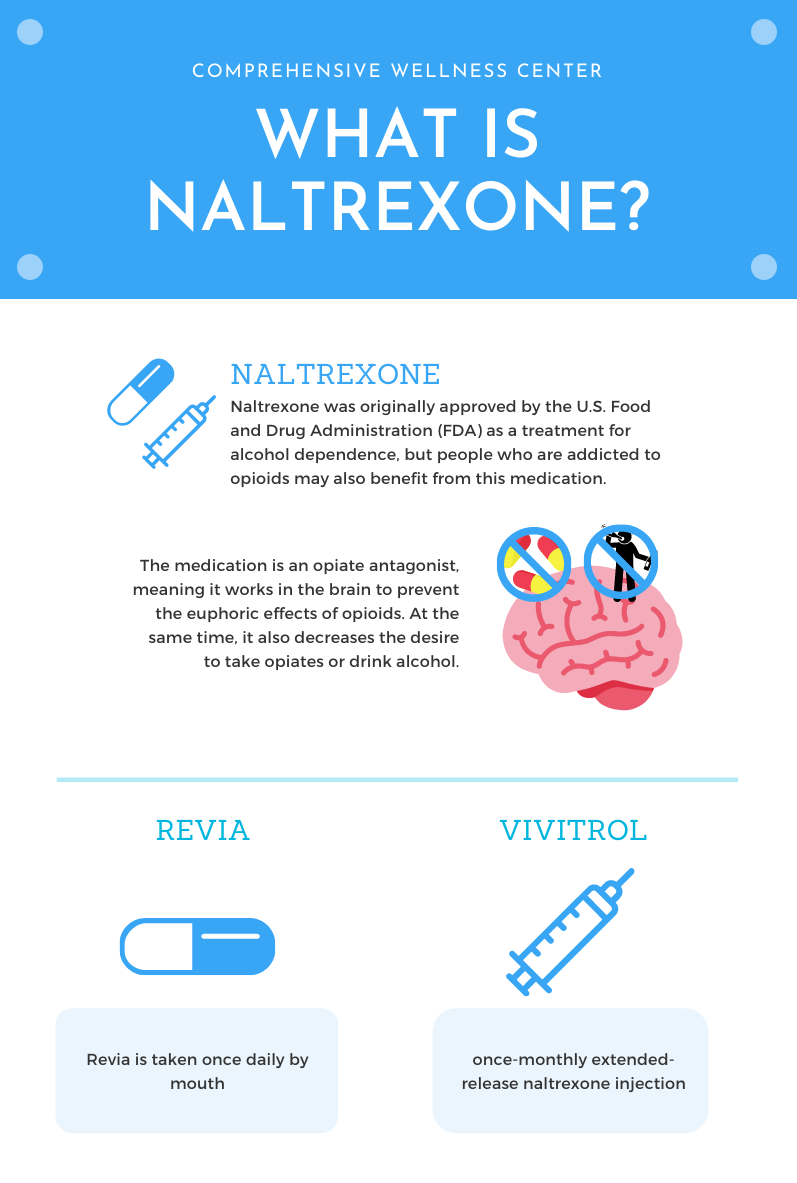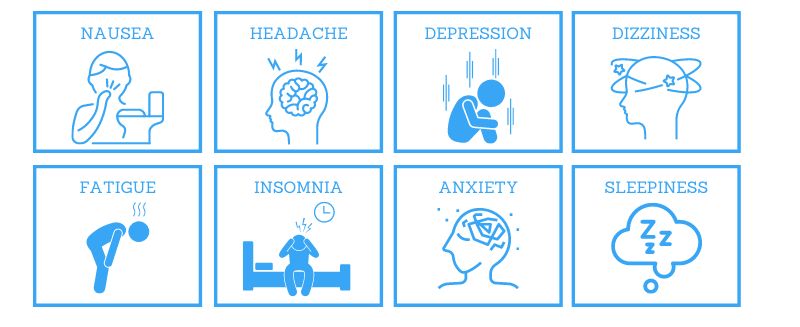Everything You Need To Know About Naltrexone Treatment
Naltrexone, also sold under the brand names Revia or Vivitrol, is a medication that helps support people in recovery from opioid or alcohol addiction. People who participate in a naltrexone treatment program will also participate in behavioral therapies, individualized counseling, and lifestyle changes. In terms of opioid addiction, the medication helps reverse the effects of opioids in the brain. For alcoholism, on the other hand, naltrexone helps suppress the desire to drink. As a result, when used in tandem with a comprehensive treatment program, naltrexone is a highly effective medication for people looking to stay sober.
Our West Palm Beach naltrexone program consists of Vivitrol treatment and an individualized medication-assisted rehab program. From the moment you begin your rehab journey until beyond your discharge date, our addiction specialists will be available to help manage your medications and provide you with the tools needed to stay sober.
Naltrexone: What it is and How it Works
Naltrexone was originally approved by the U.S. Food and Drug Administration (FDA) as a treatment for alcohol dependence, but people who are addicted to opioids may also benefit from this medication. The medication is an opiate antagonist, meaning it works in the brain to prevent the euphoric effects of opioids. At the same time, it also decreases the desire to take opiates or drink alcohol.

Before starting naltrexone, people should take a urine test to screen for recent opioid use. Furthermore, patients should stop their drug use at least 7 days before starting the medication. Similarly, patients should complete an alcohol detox before taking the medication, as drinking or taking opioids while on naltrexone is advised against.[1]
Naltrexone comes in pill form and is taken by mouth with or without food. Most people will start by taking 50mg a day, however, your doctor may adjust your dose accordingly.
Revia vs. Vivitrol
![]()
Revia is the brand name medication for naltrexone. Similar to generic naltrexone, Revia is taken once daily by mouth. However, another form of naltrexone is becoming more popular than Revia. Vivitrol, a once-monthly extended-release naltrexone injection is quickly becoming one of the most popular treatments for opioid and alcohol abuse. The intramuscular injection is administered in the buttock by a healthcare professional. As an injection, people don’t have to worry about medication compliance or potential abuse.
Side Effects of Naltrexone
According to the National Institute on Alcohol Abuse and Alcoholism (NIAAA), the most common side effects of naltrexone occurred in less than ten percent of people, including:[2]

Most of these side effects are mild and wear off quickly. In fact, many people experience little to no side effects so they don’t even realize they are taking medication. Furthermore, the medication does not reduce the effectiveness of most medications, like over the counter pain relievers, antibiotics, allergy medications, and local and general anesthesia. Still, patients who are taking the medication should carry a card with them explaining that they are taking naltrexone.
When it comes to intramuscular naltrexone in the form of Vivitrol, the most common side effects are redness, swelling, itching, and irritation at the injection side – symptoms which usually subside within one or two weeks.
In rare cases, naltrexone is linked to liver disease, For this reason, patients should receive blood testing to determine their liver function prior to starting treatment with naltrexone. Similarly, the medication may cause allergic reactions in severe cases. If you or a loved one start taking naltrexone and have any severe side effects, such as trouble breathing, rash, allergic reaction, or severe dizziness, you should stop taking the medication and seek medical attention.
Naltrexone for Opioid & Alcohol Abuse Treatment
Although naltrexone does not treat opioid or alcohol withdrawal symptoms, it can help people who have completed detox to stay sober. In people who have stopped drinking, the medication helps eliminate alcohol cravings that alcoholics would otherwise experience after quitting drinking. Alternatively, when used to treat opioid addiction, the medication is thought to help repair neural pathways in the brain that transmit dopamine, thereby reducing opioid cravings.
Research has shown that addiction treatment with naltrexone works best when the medication is combined with a comprehensive treatment regimen including therapy, peer support, and monitoring. After all, there is no medical cure for addiction. Instead, it is managed with treatment, therapeutic support, and medical interventions.
While taking naltrexone, Revia, or Vivitrol, patients are required to participate in group and individual therapies. Therapy helps address the underlying causes and conditions of a person’s substance abuse so they can begin to change their behaviors, analyze thought processes, and adopt healthier coping mechanisms. In addition to behavioral therapies, patients should participate in a 12-step or recovery-based support program so they can connect with their peers and obtain support for long-term recovery.
Fortunately, unlike other treatment medications like methadone or Subutex, naltrexone is not addictive and has a very low risk for abuse. Moreover, the medication does not cause physical dependence, so patients can stop taking the medication at any time without experiencing difficult withdrawal symptoms.
Throughout the course of treatment, each patient is closely monitored for their progress and any potential side effects. Depending on your progress and interaction with the medication, your dose may be adjusted accordingly until you are ready to stop taking the medication entirely.
Benefits of Medication Assisted Treatment for Opioid and Alcohol Addiction
When combined with behavioral counseling and peer support, medication-assisted treatment using naltrexone provides many benefits to patients. In fact, patients who take naltrexone, attend Alcoholics Anonymous (AA), and complete rehab have better treatment outcomes than people who take medication only.[2] According to the Substance Abuse and Mental Health Services Administration (SAMHSA), this treatment approach is proven to:[3]
- Improve rates of patient survival after treatment
- Increase treatment retention rates
- Decrease rates of opioid and alcohol use after treatment
- Decrease rates of criminal activity associated with substance abuse
- Improve patient ability to gain and maintain a job
- Improve birth outcomes in women with substance use disorders who are pregnant
- Decrease rates of bloodborne illness transmission
Although naltrexone is a highly effective form of substance abuse treatment, it doesn’t work for everyone. As a result, you should always speak with a dedicated healthcare provider before taking any substance abuse treatment medications.
Naltrexone Treatment in West Palm Beach, FL
At Comprehensive Wellness Centers, located just outside of West Palm Beach, Florida, our medical staff makes a collaborative effort to work with clients on an individual level. Not only will we help you create a medication regiment that works for you, but we will focus on giving you the lowest dose possible to minimize the side effects and help you ultimately achieve complete abstinence. Our medication-assisted treatment program aims to treat the physical, mental, and spiritual aspects of a person’s drug or alcohol addiction.
If you think Naltrexone may be right for you, contact a dedicated treatment provider in West Palm Beach today.
References:













